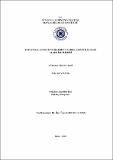DSpace@İHÜ
TOPLUMSAL CİNSİYET ROLLERİNİN KADINLARIN İYİLİK HALİ ALGISI İLE İLİŞKİSİ
JavaScript is disabled for your browser. Some features of this site may not work without it.
| dc.contributor.author | Haymana, Pelin
|
|
| dc.date.accessioned | 2020-01-14T07:28:08Z | |
| dc.date.available | 2020-01-14T07:28:08Z | |
| dc.date.issued | 2019-04 | |
| dc.identifier.uri | http://hdl.handle.net/11547/5295 | |
| dc.description.abstract | Toplumlar, kültürel yapılarına göre toplumsal roller yaratmaktadır. Kültürel motiflerin yarattığı değerlerden birisi de kadının toplumsal cinsiyet rolleridir. Kadın, toplumun cinsiyet rollerine ilişkin tutumlardan etkilenir ve algısına göre bir yaşam çerçevesi oluşturur. Toplumsal cinsiyet rollerine ilişkin kadın algısının yarattığı cam tavan sendromu buna örnek verilebilir. Toplumsal cinsiyet rolleri kadının iş, sosyal yaşam ve psikolojik iyilik hallerini etkileyebilir. Kadının toplumsal cinsiyet rolleri algısı onun nasıl yaşaması gerektiği konusunda bir kadına sınırlılıklar yaratabilir. Araştırmanın amacı kadınların psikolojik iyilik halinin, toplumsal cinsiyet rolleri algısıyla ilişkisini incelemektir. Bu çalışma ilişkisel tarama yöntemiyle yapılmış nicel bir çalışmadır. Araştırmada Psikolojik İyilik Halinin, Toplumsal Cinsiyet Rolleri ile ilişkisi incelenmiştir. Araştırmanın çalışma grubu kolay ulaşılabilir örneklem yöntemi ile ulaşılmıi İstanbul ili Çekmeköy ilçesindeki 148 kadından oluşmaktadır. Çalışma grubunun evren içerisinde %95 güven aralığındaki hata payı %8,05 olarak hesaplanmıştır. Araştırma verileri Psikolojik İyilik Hali Ölçeği ve Toplumsal Cinsiyet Rolleri Tutum Ölçeği ile toplanmış ve SPSS21. paket programında analiz edilmiştir. Araştırma sonucunda psikolojik iyilik hali alt boyutları ile toplumsal cinsiyet rolleri alt boyutları arasında anlamlı düzeyde korelatif ilişkiler tespit edilmiştir. Anlamlı ilişki bulunan değişkenler arasında yapılan regresyon sınamaları sonucunda, TCRTÖ eşitlikçi cinsiyet rolü puanlarının çevre ile ilişkilerde hakimiyet kurma puanlarını %37, toplumsal cinsiyet rolleri (TCRTÖ) alt boyutlarından evlilikte cinsiyet rolü puanlarının psikolojik iyilik alt boyutlarından kendini kabul etme puanlarını %33 büyüklüğünde negatif yönlü, TCRTÖ eşitlikçi cinsiyet rolü puanlarının psikolojik iyilik alt boyutlarından özerklik puanlarını %26 büyüklüğünde negatif yönlü ve TCRTÖ kadın cinsiyet rolü puanlarının psikolojik iyilik alt boyutlarından özerklik puanlarını %20 büyüklüğünde ve anlamlı düzeyde yordadığı tespit edilmiştir. Kadınların yaş, yaşam yeri, baba öğrenim durumu, kadının kendi öğrenim durumu, çalışma durumu ve ekonomik durum grupları arasında psikolojik iyi oluş alt boyutlarının anlamlı düzeyde farklılaştığı görülmüştür. | tr_TR |
| dc.language.iso | tr | tr_TR |
| dc.publisher | İSTANBUL AYDIN ÜNİVERSİTESİ SOSYAL BİLİMLER ENSTİTÜSÜ | tr_TR |
| dc.subject | Psikolojik İyilik Hali | tr_TR |
| dc.subject | Toplumsal Cinsiyet Rolleri | tr_TR |
| dc.subject | Kadın | tr_TR |
| dc.subject | İlişkiler | tr_TR |
| dc.subject | Psychological Well-Being | tr_TR |
| dc.subject | Social Gender Roles | tr_TR |
| dc.subject | Women | tr_TR |
| dc.subject | Relationships | tr_TR |
| dc.title | TOPLUMSAL CİNSİYET ROLLERİNİN KADINLARIN İYİLİK HALİ ALGISI İLE İLİŞKİSİ | tr_TR |
| dc.type | Thesis | tr_TR |
| dc.description.abstractol | Societies create social roles according to their cultural structure. One of the values created by cultural motifs is the social gender roles of women. Women are affected by attitudes towards gender roles of society and create a life frame according to the perception. Glass ceiling syndrome created by women's perceptions of gender roles is an example of this. Social gender roles can affect women's work, social life and psychological state of well-being. Women's perception of social gender roles may create limitations on how they should live. The aim of the study is to analyze the correlation between women's psychological well-being and their perception of gender roles. This study is a quantitative study conducted by relational screening method. In this study, the relationship between Psychological Well-Being and Gender Roles was analyzed. The study group of the research consisted of 148 women in Çekmeköy, İstanbul, which was reached with an easily accessible sampling method. The error margin in the 95% confidence interval of the study group was calculated as 8,05% in the population. The data were collected by the Psychological Well-being Scale and the Gender Role Attitudes Scale and analyzed in the SPSS21. package program. As a result of the study, a significant correlation was determined between the subdimensions of psychological well-being and gender roles. As a result of the regression tests conducted between the variables that have a meaningful relationship, the GRAS egalitarian gender role scores affected to points of dominance in relations with the environment by 37%, the gender role scores in the marriage which was the sub-dimension from GRAS egalitarian gender role affected the self-acceptance scores which was the sub-dimension from psychological well-being by 33% in a negative way, the GRAS egalitarian gender role scores affected the autonomy scores which is the sub-dimension from psychological well-being by 26% and finally the GRAS women gender role scores affected the autonomy scores which is the subdimension from psychological well-being predicted by 20% in a significant level. It was observed that the sub-dimensions of psychological well-being between women's age, place of living, father's education status, women's own educational status, working status, and economic status differed significantly. | tr_TR |
| dc.publisher.firstpagenumber | 1 | tr_TR |
| dc.publisher.lastpagenumber | 126 | tr_TR |
| dc.identifier.bibliographictag | Haymana, Pelin, TOPLUMSAL CİNSİYET ROLLERİNİN KADINLARIN İYİLİK HALİ ALGISI İLE İLİŞKİSİ(2019), İSTANBUL AYDIN ÜNİVERSİTESİ SOSYAL BİLİMLER ENSTİTÜSÜ | tr_TR |
Bu öğenin dosyaları:
Bu öğe aşağıdaki koleksiyon(lar)da görünmektedir.
-
Tezler -- Thesis [3470]
